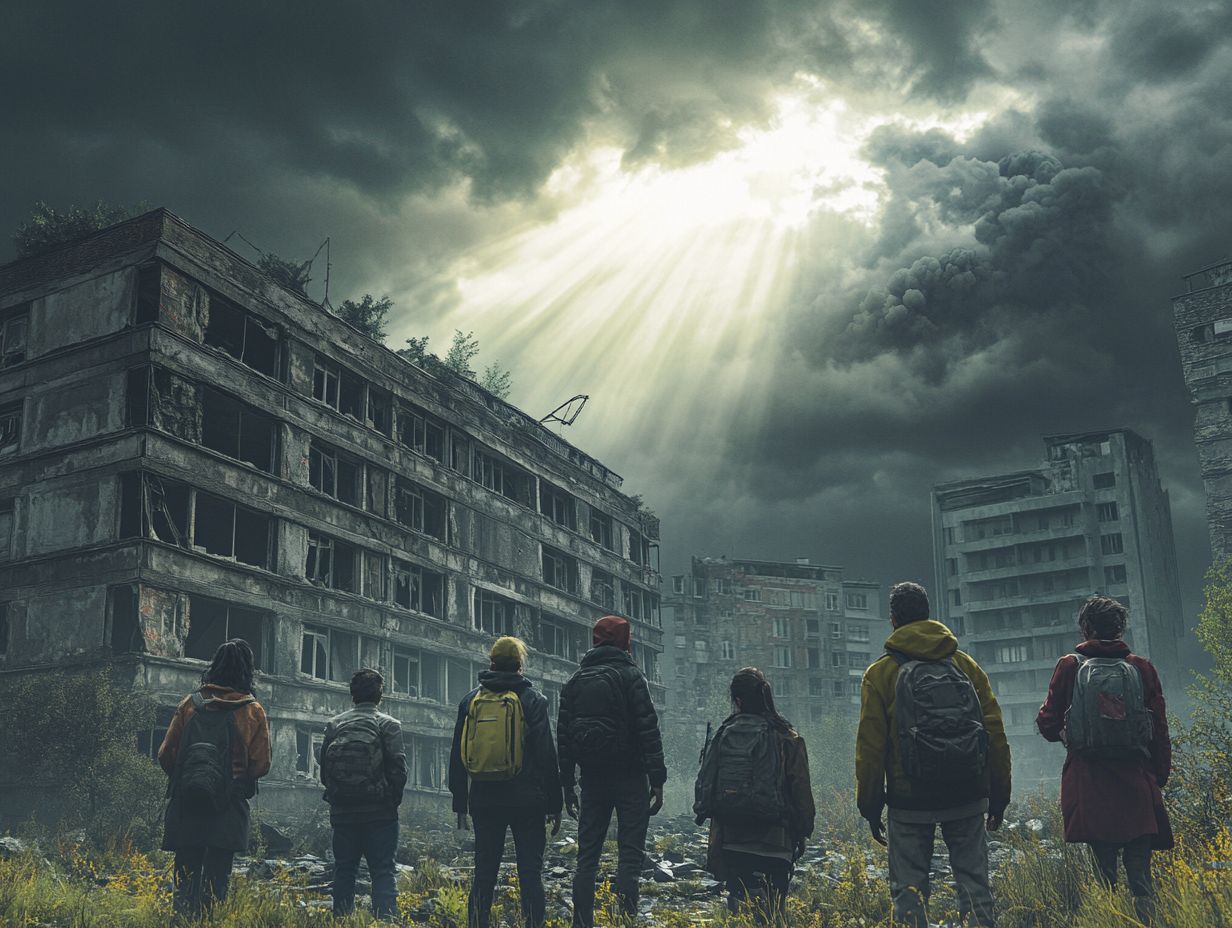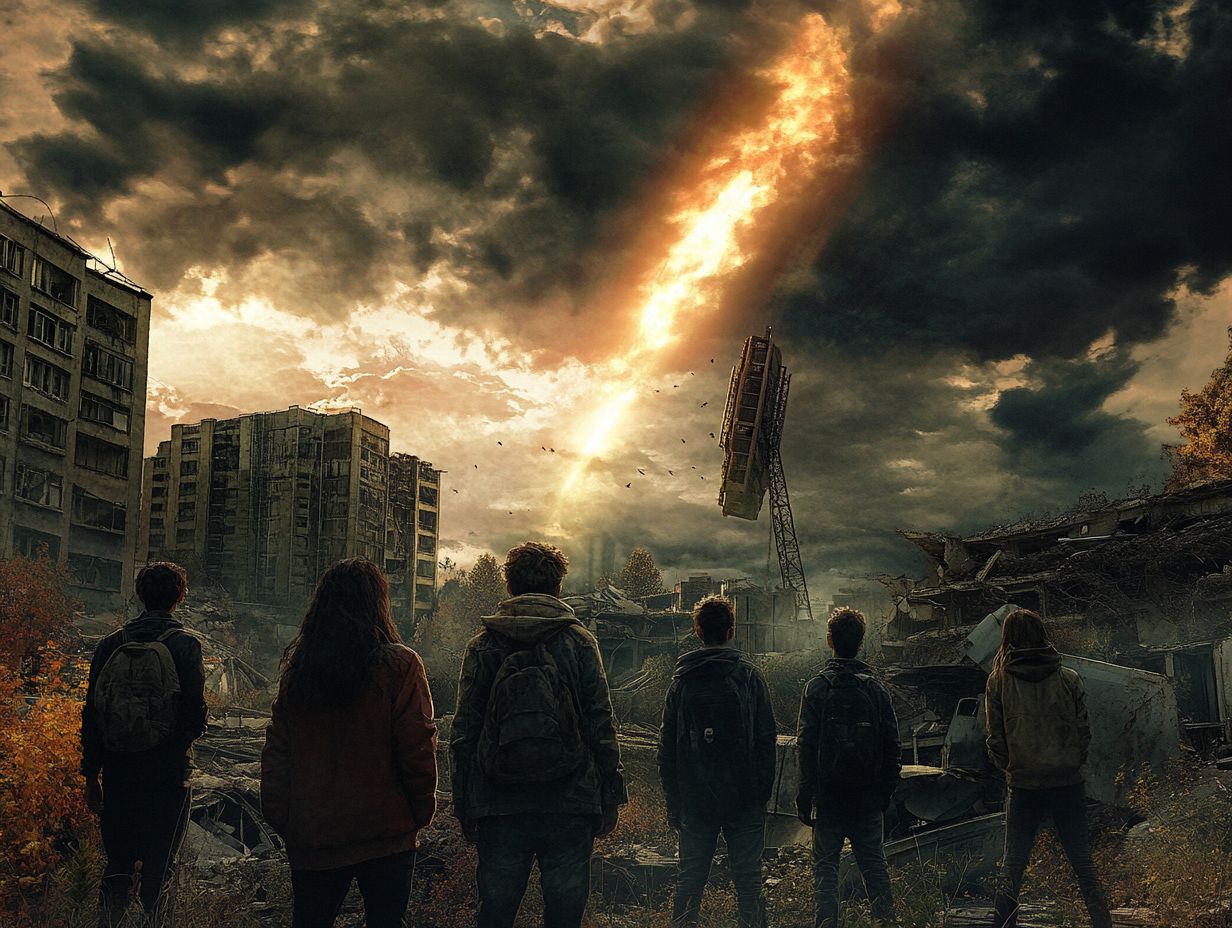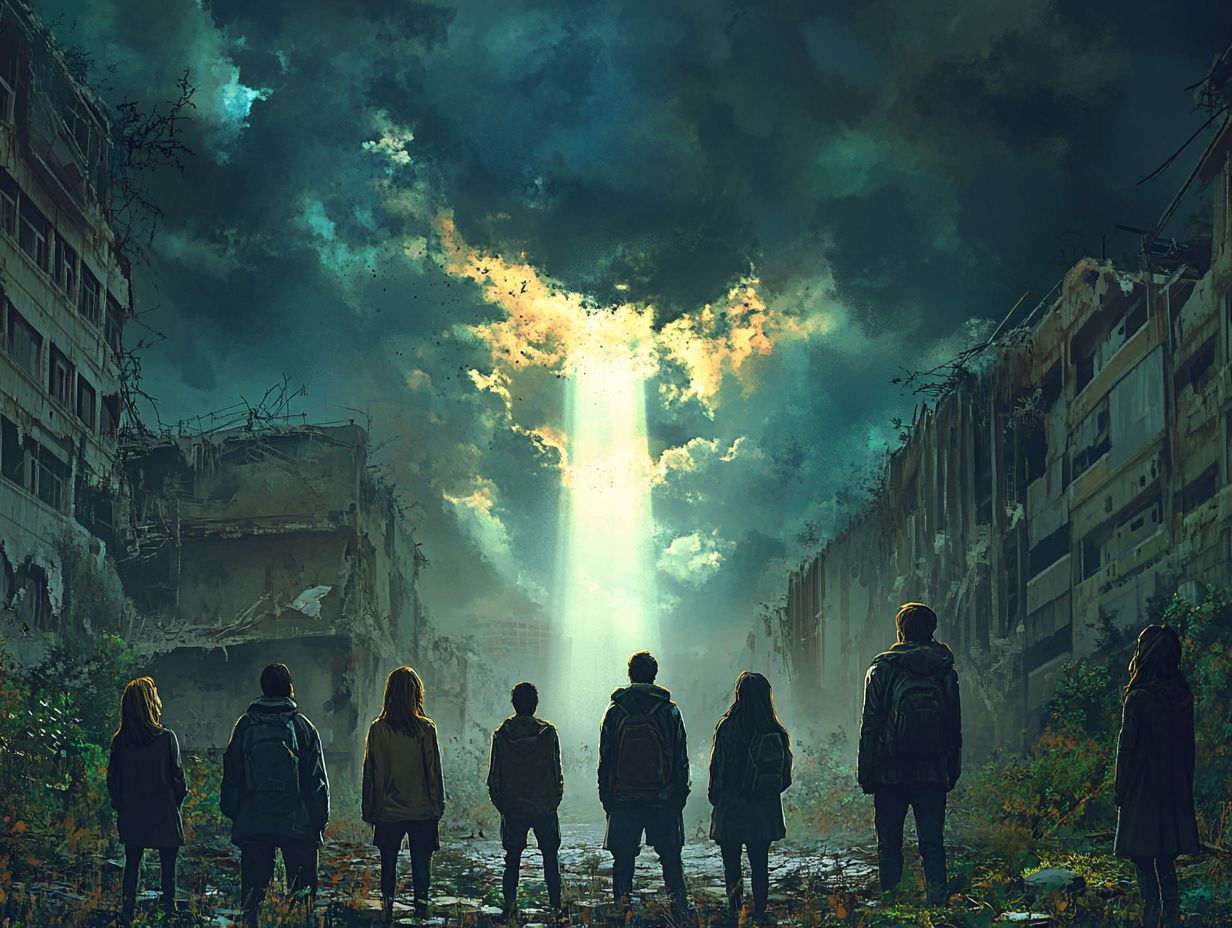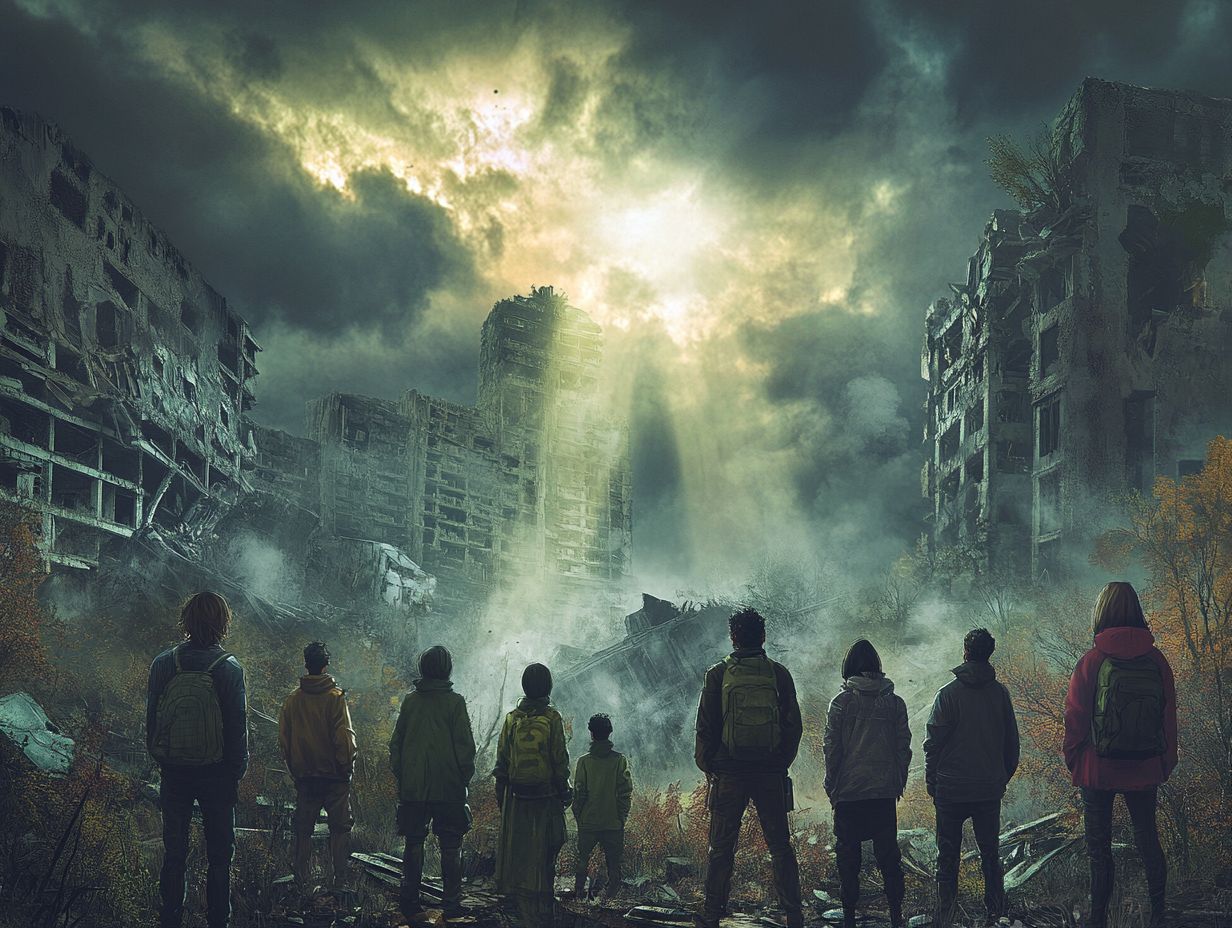From ancient prophecies to contemporary apocalyptic films, the concept of doomsday has consistently captivated human imagination throughout history. This article seeks to explore the underlying psychological factors that contribute to the fascination with the end of the world.
It examines how cognitive biases and fear influence our perceptions of doomsday scenarios.
Additionally, the article addresses the mental health implications associated with doomsday thinking, offering strategies for coping with anxiety and discussing the role of media in perpetuating these beliefs.
This exploration invites readers to consider the complex landscape of humanity’s obsession with the apocalypse and to contemplate whether this fascination will endure or undergo transformation in the future.
The Fascination with Doomsday

The fascination with doomsday scenarios has engaged human imagination across diverse cultures and generations, often influenced by profound psychological responses such as existential dread and fear of the unknown.
This preoccupation manifests in various forms, including apocalyptic literature, conspiracy theories, and sensationalized media narratives that mirror society’s anxieties regarding potential catastrophic events.
Whether addressing issues like climate change, technological collapse, or historical events interpreted as end times predictions, the appeal of doomsday scenarios resonates with our collective curiosity and survival instinct. This phenomenon reveals significant insights into our cultural identity and societal values.
What Draws Us to the End of the World?
The allure of apocalyptic scenarios frequently arises from our existential concerns and the psychological ramifications associated with the fear of societal collapse and environmental catastrophe.
As individuals navigate the uncertainties of their daily lives, this fascination with doomsday narratives often functions as a coping mechanism, enabling them to externalize their anxieties through concrete stories. Additionally, thrill-seeking behavior significantly contributes to this intrigue; individuals are often captivated by the adrenaline rush that accompanies the contemplation of catastrophic events, merging elements of fear and excitement.
Storytelling further enhances these narratives, offering a framework for the exploration of our profound fears while simultaneously provoking curiosity. By engaging with these cultural phenomena, individuals can confront their collective anxieties, striving for a sense of control amidst chaos through the lens of imaginative scenarios.
The Psychology Behind Doomsday Beliefs
Understanding the psychology underlying doomsday beliefs provides valuable insights into the cognitive biases and emotional responses that compel individuals to adopt apocalyptic narratives, frequently driven by fear and existential concerns.
This examination elucidates the interplay between collective trauma and societal values and their influence on belief systems, resulting in the proliferation of conspiracy theories and moral panic in the context of catastrophic events.
Exploring Cognitive Biases and Fear

Cognitive biases significantly influence our perception of risk and emotional reactions to doomsday scenarios, often resulting in heightened fears and catastrophic thinking.
These biases, including confirmation bias and the availability heuristic, can greatly distort an individual’s understanding of reality. For example, confirmation bias may lead individuals to actively seek and prioritize information that supports their apocalyptic beliefs while disregarding contradictory evidence. This tendency ultimately reinforces those beliefs and exacerbates anxiety.
Similarly, the availability heuristic prompts individuals to evaluate the likelihood of disaster based on the ease with which examples come to mind, often intensifying feelings of dread during crises. Collectively, these cognitive shortcuts complicate emotional regulation, making it increasingly challenging to manage stress and uncertainty as the psychological environment becomes more saturated with fears of potential cataclysmic events.
The Impact of Doomsday Thinking on Mental Health
Doomsday thinking can have a profound impact on mental health, resulting in increased anxiety, feelings of hopelessness, and difficulties in emotional regulation, particularly in a context where climate change and societal fears are increasingly prevalent.
It is essential to understand the psychological resilience of individuals and communities in order to effectively manage the emotional repercussions of apocalyptic beliefs and to promote effective coping mechanisms in the face of pervasive fear.
How Obsession with the End Can Affect Us
The preoccupation with doomsday scenarios can manifest in various ways, influencing individual behavior and societal dynamics as individuals confront their fear of the unknown and seek meaning during periods of existential crisis.
This collective anxiety frequently compels individuals to adopt nihilistic attitudes or to cultivate stronger connections within their communities, highlighting the intricate balance between individualism and collectivism. For some, the apprehension of impending chaos results in a retreat into self-centered survivalism, while others find comfort in community-based coping strategies, thereby fostering resilience through shared experiences.
Such responses can significantly influence one’s worldview, altering how societies respond to threats and uncertainties. An exploration of these dynamics sheds light on the ways in which individuals navigate fear, developing responses that address both personal anxieties and broader societal needs.
Dealing with Doomsday Anxiety

Addressing doomsday anxiety necessitates the implementation of effective coping mechanisms that prioritize emotional regulation and promote psychological resilience. These strategies enable individuals to confront and manage their fears related to potential disasters or societal collapse.
Strategies for Coping with Fear and Uncertainty
Implementing effective strategies for managing fear and uncertainty can significantly mitigate the emotional responses triggered by catastrophic scenarios, thereby enabling individuals to develop psychological resilience.
Engaging in mindfulness practices, such as meditation and deep-breathing exercises, allows individuals to cultivate a sense of calm in the face of chaos. Additionally, employing cognitive behavioral techniques enables individuals to challenge and reframe negative thought patterns that may exacerbate anxiety.
Participating in community support systems can further reinforce this resilience by fostering connections and shared experiences, which can help individuals feel less isolated in their fears. Ultimately, by addressing the root causes of uncertainty and actively seeking support, individuals can navigate their emotional landscapes with greater strength and clarity.
The Role of Media and Popular Culture
The influence of media and popular culture in shaping doomsday beliefs is significant, as these elements frequently amplify fears through sensationlism and the widespread dissemination of dystopian narratives that resonate with our cultural identity.
Influences on Doomsday Beliefs and Perceptions

The influences on doomsday beliefs and perceptions are multifaceted, encompassing cultural narratives, conspiracy theories, and fearmongering that shape societal responses to perceived threats.
These narratives often draw upon historical events, religious texts, and popular media, leading individuals to internalize apocalyptic visions that resonate within their specific cultural contexts. Consequently, the impact of doomsday beliefs extends beyond mere speculation; they have the potential to incite panic, influence political discourse, and foster divisions within communities.
Moreover, the proliferation of conspiracy theories further complicates the landscape, as they cultivate mistrust in institutions and promote an ‘us versus them’ mentality. As a result, the emotional responses elicited by these beliefs can vary widely, ranging from anxiety and paranoia to a sense of enablement among those who feel prepared for potential cataclysmic events, thereby illustrating the significant influence such ideas can exert on the collective psyche.
The Future of Doomsday Thinking
The future of doomsday thinking is uncertain, as societal resilience and environmental psychology interact with our collective consciousness, influencing how we address fears related to potential cataclysms.
Will Our Fascination End or Evolve?
As society continues to navigate the complexities of contemporary existence, the interest in doomsday scenarios may not diminish but rather transform, reflecting shifts in human behavior, cultural mythology, and existential contemplation.
In this dynamic environment, changes in societal values, driven by advancements in technology and communication, have the potential to alter how individuals perceive and respond to apocalyptic situations. The rise of virtual realities and digital platforms is likely to enhance these narratives, providing immersive experiences that intertwine entertainment with profound existential inquiry.
As global crises—such as climate change and political unrest—intensify, a collective awareness may develop, fostering a deeper understanding of our vulnerabilities. This evolving perspective may invoke not only a sense of fear but could also inspire proactive strategies and community resilience, ultimately transforming mere fascination into a catalyst for meaningful discussions regarding humanity’s role in an uncertain future.


